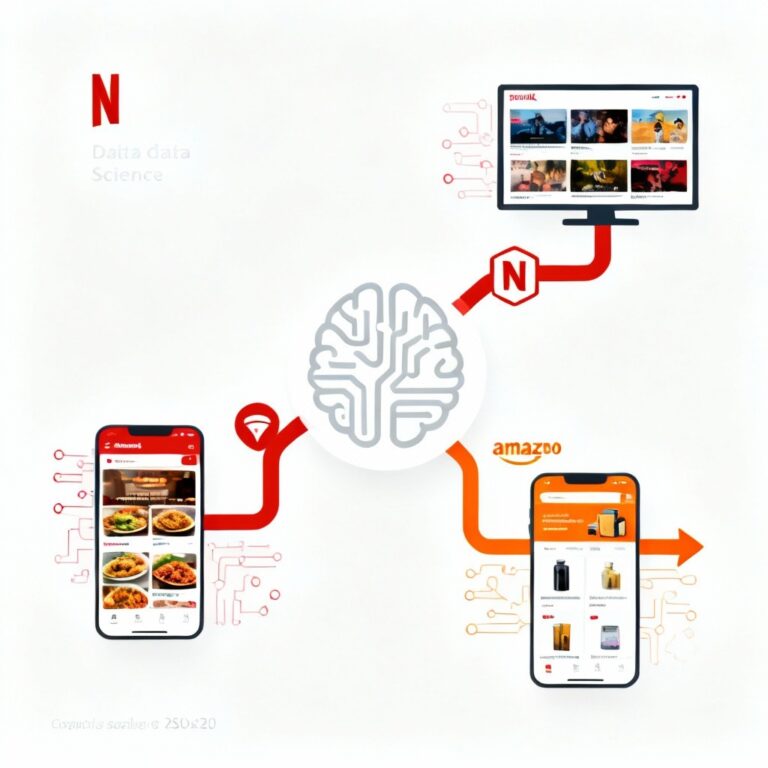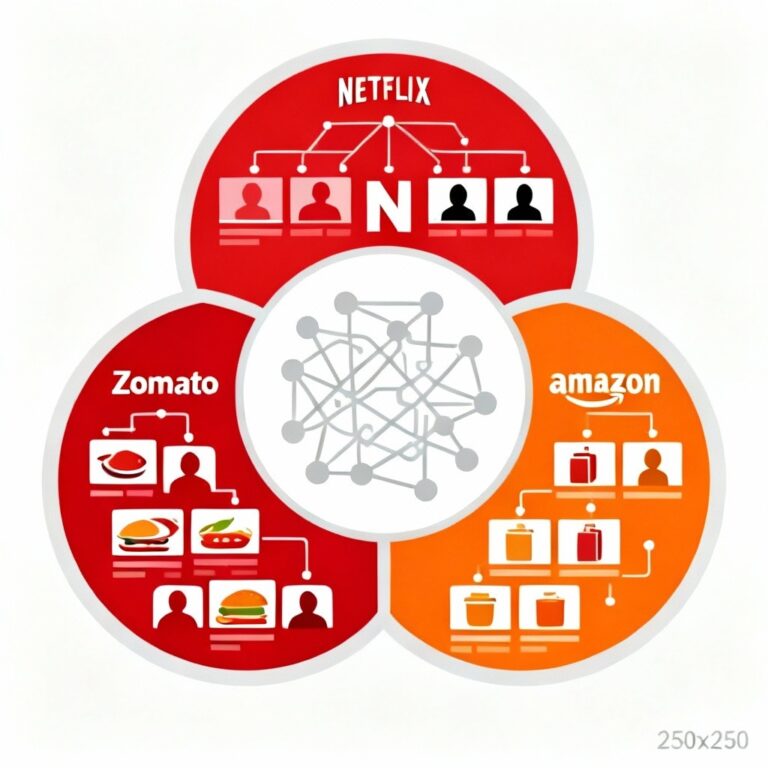Apply For Scholarship
In the age of digital-first economy, companies that reign supreme are the ones who know their customers inside and out. Consider Netflix suggesting the ideal show for your weekend, Zomato recognizing when you’re hungry for biryani, or Amazon recommending that very product you didn’t even know you required. These are not accidents — they’re the product of data science in large scale.
Data science is the foundation of contemporary decision-making, enabling businesses to leverage data not just to comprehend the present but also to forecast the future. Through personalized suggestions, operation optimization, or real-time pricing, businesses such as Netflix, Amazon, and Zomato are transforming customer interaction with predictive analytics, machine learning, and artificial intelligence.

Fundamentally, predictive analytics relies on using historical data, machine learning models, and statistical algorithms to predict what is going to happen in the future. It enables businesses to:
Anticipate what customers are going to buy, watch, or eat.
Build hyper-personalized experiences.
Minimize operational expenses and inefficiencies.
Enhance customer loyalty by staying ahead of the game.
This power to predict future actions makes predictive analytics a game-changer. Let’s see how it drives three international giants.
Netflix: Redefining Entertainment with Data
Netflix is not only a streaming service — it’s an analytics behemoth. Its recommendation engine powers almost 80% of content streamed, and it’s evidence that personalization is its best-kept secret.

Collaborative Filtering – Matches user activity to determine common patterns and suggest shows enjoyed by similar users.
Matrix Factorization – Splits huge datasets into thin layers to determine concealed preferences.
Contextual Cues – Netflix takes into account device type, day or night, and even where you left off on a show.
Real-World Example:
Prior to greenlighting House of Cards, Netflix analyzed:
A growing trend toward political dramas.
The popularity of actor Kevin Spacey.
The success of director David Fincher’s films.
This was no risk – it was a strategic investment fueled by data science that paid dividends with millions of viewers around the globe.
Amazon: The Master of E-Commerce Personalization
Amazon has created its fortune by knowing the customers better than anybody else. Its recommendation engine itself produces 35% of all revenues, one of the most lucrative uses of data science in history.
Item-to-Item Collaborative Filtering – Makes recommendations from products purchased together (buy a phone → receive a charger suggestion).
Deep Learning Models (RNNs) – Understand purchase sequences and predict the next likely product you’ll need.
Dynamic Pricing Algorithms – Prices change in real-time based on demand, competition, and browsing history.
Real-World Example:
Amazon foresaw the rise of smart devices and launched Alexa-powered Echo, dominating the smart home market. This move wasn’t luck — it was data-driven foresight.
Zomato: Data Science Meets Food & Delivery
Zomato has more to contend with than digital personalization — it also needs to deal with actual logistics in the real world such as food preparation and delivery timing. Data science is responsible for a seamless, delicious customer experience.
Traffic & Route Optimization – Forecasts delivery times by looking at traffic and weather patterns.
Demand Forecasting – During holiday seasons such as Diwali or Ramzan, Zomato forecasts popular cuisine and stocks up accordingly.
Customer Personalization – Suggests meals based on order history, local food culture, and even weather (pakoras on rainy days!).
Restaurant Ranking Algorithms – Monitors performance, delays, and reviews to ensure only reliable restaurants get recommended.
Real-World Example:
On a rainy evening in Bengaluru, Zomato might recommend hot samosas or chai from your favorite restaurant. That’s data-driven comfort food delivered right to your door.
The Ethical Side of Data Science

Privacy Risks – Businesses gather sensitive information; its mismanagement will create enormous trust problems.
Algorithm Bias – Recommendations will favor some products or services unfairly if data is biased.
Filter Bubbles – Excessive personalization will restrict users from seeing new content or ideas.
To address these, businesses are putting investment into ethical AI frameworks, transparency, and control of the data by users.
The Future of Data Science in Business
Netflix, Amazon, and Zomato’s use of data science is just the tip of the iceberg. Here’s where things are going:
Generative AI for Personalization – Picture Netflix designing trailers for you based on your viewing habits or Zomato predicting food choices based on your fitness goals.
Voice and Conversational AI – Amazon Alexa will become so advanced that it’ll predict what you need to buy before you even think of it.
Hyper-Personalized Marketing – Companies will provide experiences so customized that they’ll be as if you were having a one-to-one conversation.
Real-Time Predictive Models – Computers will adapt suggestions in real-time as you change your behavior.
The decade ahead will turn data science into the foundation of every customer interaction.
Lessons for Learners & Businesses
Data is the New Currency – The more customer data you know, the better your judgments.
Personalization Wins Loyalty – Experiences customized to an individual create stronger emotional bonds.
Technology Isn’t Enough – Human judgment and ethical responsibility are still essential.
Continuous Learning – Data science tools, algorithms, and platforms change fast; being current is not an option
Netflix, Amazon, and Zomato are not only industry titans — they are case studies in how data science turns companies into customer-centric behemoths. From binge-watching content to speedy deliveries and endless choices for shopping, every swipe and click you take is part of an enormous data-fueled strategy.
For future professionals, it’s a wake-up call. To succeed in the digital economy, data science, predictive analytics, and AI skills must be mastered. And for companies, the message is clear: get on board with data science or get left behind.
The future goes to those who have the ability to marry data, creativity, and ethics to create unprecedented customer value.
Netflix relies heavily on data science to personalize entertainment for its users. Its algorithms analyze your watch history, viewing patterns, ratings, and even the time of day you watch. Using techniques like collaborative filtering, matrix factorization, and contextual analysis, Netflix suggests shows and movies tailored to your taste. In fact, nearly 80% of total viewing comes from its recommendation engine, proving how central data science is to its success.
Amazon uses predictive analytics to anticipate customer needs and enhance shopping experiences. Its item-to-item collaborative filtering recommends products that are frequently bought together, while deep learning models analyze purchase sequences to predict what you might buy next. Amazon also uses dynamic pricing algorithms, which adjust prices in real time based on demand, competition, and browsing history. This approach not only increases sales but also boosts customer satisfaction by making shopping highly personalized.
Zomato combines digital personalization with real-world logistics through data science. It predicts delivery times by analyzing traffic, weather, and restaurant performance in real time. During festive seasons like Diwali or Ramzan, its demand forecasting models predict trending dishes and help restaurants prepare accordingly. Zomato also personalizes meal suggestions based on customer history, local food preferences, and even weather conditions—like recommending pakoras on a rainy day. This makes the customer experience more relevant and engaging.
While data science offers immense benefits, it also raises ethical challenges.
Privacy Risks: Companies handle sensitive customer data; misuse or leaks can damage trust.
Algorithm Bias: If the data is biased, recommendations may favor certain products, content, or vendors unfairly.
Filter Bubbles: Over-personalization can restrict users to limited choices, preventing them from discovering new options.
To address these issues, companies like Netflix, Amazon, and Zomato are investing in ethical AI practices, transparency, and user control over data sharing.
The future of data science lies in creating hyper-personalized, real-time experiences. Trends include:
Generative AI for personalization: Netflix could auto-create personalized trailers, while Zomato might design AI-generated food suggestions based on diet plans.
Voice & Conversational AI: Amazon Alexa is evolving to predict shopping needs before users even search.
Real-Time Predictive Models: Algorithms will update recommendations instantly as user behavior changes.
Hyper-Personalized Marketing: Businesses will move closer to one-to-one communication with customers.
For both businesses and professionals, mastering AI, machine learning, and predictive analytics will be key to staying competitive.
Asia’s Leading Digital Marketing & Data Science Institute
A comprehensive methodology with the best curriculum, designed according to current corporate demands and needs.
Copyright © NDMIT Edusoft Private Limited
For security purposes, please solve this simple puzzle to verify you are human before sending an OTP.